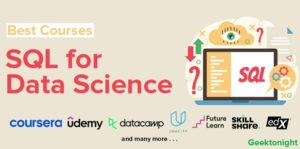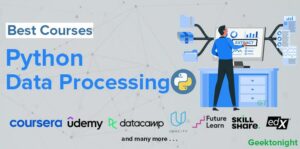Data modeling is a crucial process in the field of database management and information systems. It involves creating a structured representation of the data used within an organization or system. This representation helps in understanding the data’s relationships, constraints, and properties, which in turn aids in designing efficient databases and systems. For individuals aspiring to master data modeling, there is a wide range of educational options available. Best Data Modeling courses are an excellent way to gain in-depth knowledge and skills in this field.
Data modeling is a foundational step in designing and developing robust database systems. It helps in creating a clear and structured representation of data that aligns with the organization’s needs, facilitating effective communication and system development. It serves as a bridge between the real-world entities and the digital representation of those entities within a database.
Why is Data Modeling important?
In today’s data-driven world, organizations collect and manage vast amounts of data, and the ability to design databases that accurately represent the real-world entities and their relationships is crucial. Data modeling ensures data integrity, minimizes redundancy, and maximizes query performance. Professionals who can design well-structured databases are highly sought after as they contribute to the overall success of an organization’s data management strategy.
The demand for data modeling skills is growing rapidly. The demand for data science professionals is expected to grow to 11.5 million by 2026 . This is due to the increasing amount of data that businesses are collecting and the need to make sense of this data. Learning data modeling can greatly enhance one’s career prospects for several reasons. Whether you’re aiming to become a database administrator, data analyst, data scientist, software developer, or even a business analyst, a solid understanding of data modeling can set you apart and open up numerous opportunities and one of the best ways to learn data modeling is by enrolling in the Best Data Modeling courses online.
Table of Content
Our product recommendations are unbiased and based on an independent review process. We may receive a commission for links to recommended partners. See our advertiser disclosure for more information.
Best Data Modeling Courses, Certification, Tutorials, Training, Classes Online
Advanced Data Modeling [Coursera]
The Advanced Data Modeling course, offered as part of the Meta Database Engineer Professional Certificate program, delves into the intricacies of advanced database concepts. By engaging in this course, you will acquire valuable skills, including deploying fundamental data modeling techniques, navigating contemporary storage options for data warehouses, and executing ETL-style database engineering based on existing MySQL proficiency.
Course Instructor
The Advanced Data Modeling certification course is made by distinguished Meta Staff. With a wealth of expertise and experience in the field of database engineering, Meta Staff brings a unique blend of theoretical knowledge and practical insights to the course content.
What you’ll learn
This course is part of Meta Database Engineer Professional Certificate, it contains the following modules:
- Data Modeling and Management: You will delve into the intricate world of data modeling, understanding how to structure and represent data in a way that optimizes storage, retrieval, and analysis.
- Data Warehousing: Discover the realm of data warehousing, exploring how to efficiently store and manage vast amounts of data.
- Advanced Data Analytics: Building upon foundational analytics concepts, this course delves into advanced techniques for extracting meaningful insights from data.
- Modeling and Analyzing Data: The course will guide you through the process of modeling data for various analytical purposes.
Pros & Cons
Pros
- Hands-on Projects
- Career Relevance
Cons
- Technical Prerequisites
- Intermediate Level Requirement
Key Highlights & Learning Objectives
- Practical projects and real-world scenarios are integrated into the course, allowing learners to apply theoretical concepts to tangible situations.
- The course places a strong emphasis on applying data modeling skills in authentic project environments. This prepares learners to address practical challenges they might encounter in their careers.
- The course introduces participants to a variety of tools and software used in data modeling, ETL, administration, monitoring, and debugging.
- Being part of the Meta Database Engineer Professional Certificate program, the course aligns with high-growth career paths in the field.
- The course includes 4 modules with over 17 hours of video content plus, 30 readings and 10 quizzes. It also offers a certificate upon successful completion of the course.
Who is it for?
The Advanced Data Modeling certification course is tailored for individuals seeking to advance their expertise in the realm of data engineering and management. It is an ideal fit for professionals aiming to enhance their career prospects by mastering modern storage techniques, advanced analytics, and real-world data modeling applications.
Rating: 4.7/5
Students Enrolled: 15,216
Duration: 18 hours
Microsoft Power BI Desktop for Business Intelligence [Udemy]
The Udemy Microsoft Power BI Desktop for Business Intelligence course is a comprehensive and highly rated program designed to empower individuals with the skills and knowledge needed to excel in the realm of data modeling and business intelligence. With a solid foundation in Microsoft Power BI, you’ll be guided through a series of stages.
Course Instructor
The instructors behind the Microsoft Power BI course are highly accomplished professionals from Maven Analytics. Chris Dutton himself is the founder of Maven and a prominent figure in the field of data analytics instruction, with a vast student reach of over a million learners worldwide. Alongside him is Aaron Parry, a seasoned analytics consultant and Power BI expert with a decade of experience in business intelligence and marketing analytics.
Pros & Cons
Pros
- Hands-On Approach
- Project-Based Learning
Cons
- Windows (OS) Only
- High Learning Curve
Key Highlights & Learning Objectives
- The course covers the entire business intelligence workflow, from creating data models for beginners and transformation to creating advanced data connections.
- Participants engage in hands-on projects, simulating real-world scenarios to apply learned concepts and develop practical skills.
- The skills acquired from this course are directly applicable to data analysis and business intelligence roles, making participants job-ready in a competitive market.
- Mimic real-world tasks encountered by data professionals, ensuring practical relevance and application.
- This course has 10 sections with 190 lectures with over 15 hours of videos, 8 articles, 7 downloadable resources and certificate of completio
Who is it for?
This course is tailored for individuals seeking to enhance their data analysis and business intelligence skills through the use of Microsoft Power BI Desktop. It is ideal for aspiring data analysts, business professionals, and Excel users who are keen to develop a strong foundation in creating insightful visualizations, interactive dashboards, and professional data models.
Rating: 4.7/5
Students Enrolled: 400,534
Duration: 15 hours
Microsoft Excel: Business Intelligence w/ Power Query & DAX [Udemy]
The Microsoft with BI Course offers a comprehensive journey into the realm of advanced Excel data analysis and business intelligence. With a focus on creating automated loading procedures, establishing relational databases, and employing powerful functions, this course equips learners with the skills to analyze vast amounts of data efficiently.
Course Instructor
This Microsoft Excel: Business Intelligence w/ Power Query & DAX certification is meticulously crafted by Chris Dutton, the founder of Excel Maven and Maven Analytics. With a deep passion for empowering individuals with data-driven insights, Chris brings his expertise as a best-selling Excel instructor to the forefront.
Pros & Cons
Pros
- Real-World Case Studies
Cons
- Laks Depth of Specialization
- Technical Prerequisites
Key Highlights & Learning Objectives
- Gain expertise in utilizing Excel’s advanced tools, including Power Query, Power Pivot, and Data Analysis Expressions (DAX).
- Engage in practical exercises, quizzes, and real-world case studies to apply theoretical knowledge to practical scenarios, ensuring a deeper understanding of concepts.
- Learn exclusive tips, tricks, and techniques that set this course apart, offering insights and strategies that might not be found in other resources.
- Learn to harness the power of Data Analysis Expressions (DAX) to create complex calculated fields and perform advanced calculations on your data.
- The course includes 7 sections with 88 lectures totaling over 7 hours of videos and offers project files, quizzes and homework exercises, and a certificate of completion.
Who is it for?
This Udemy Microsoft Excel course is designed for a diverse range of individuals who are eager to enhance their Excel skills and delve into the world of data analysis and business intelligence.
Rating: 4.7/5
Students Enrolled: 109,017
Duration: 7hours
The Complete Database Design & Modeling Beginners Tutorial [Udemy]
Database Design & Modeling Tutorial course is a comprehensive learning resource tailored for complete beginners, new to the world of databases and data modelling. Spanning from fundamental concepts to practical implementation, the course will take you through the process of designing a real-life database, using an online store as a relatable example.
Course Instructor
Rares Ilea, the instructor behind The Complete Database Design & Modeling Beginners Tutorial certification course, is a seasoned Senior Software Engineer with over 12 years of practical expertise in Web Application Development. With a passion for teaching and a wealth of industry experience, Rares has crafted this tutorial to share his knowledge with aspiring learners.
Pros & Cons
Pros
- Structured Progression
- Practical Examples
Cons
- Pacing Preferences
- Technical Complexity
Key Highlights & Learning Objectives
- The course follows a clear and organized progression from foundational concepts to more advanced topics, ensuring a gradual and coherent learning experience.
- Each theoretical concept is reinforced with multiple practical examples, helping learners bridge the gap between theory and real-world application.
- The tutorial covers essential aspects of database design, from start to finish.
- The inclusion of a practice test allows learners to gauge their understanding and prepare for applying the concepts in real-world scenarios.
- The course is designed to be accessible to those without prior coding experience, making it an ideal starting point for beginners.
- With 8 sections, 24 lectures, and just over 2 hours of video content, this course also provides 3 articles, 1 practice test and completion earns a certificate.
Who is it for?
The Database Design & Modeling course is tailored to a diverse range of individuals seeking to master the intricacies of database design.
Rating: 4.4/5
Students Enrolled: 42,958
Duration: 2 hours
Databases: Modeling and Theory [edX]
The Databases Modeling course offered by Stanford University is a comprehensive exploration of the fundamental principles and design considerations that underlie effective database systems. You’ll be introduced to the Unified Modeling Language (UML) and its application in data modeling, including the translation of UML diagrams into practical relational database schemas.
Course Instructor
The Databases: Modeling and Theory classes by Stanford University are taught by Professor Jennifer Widom. With an impressive background in the field of computer science and databases, Professor Widom is renowned for her expertise and contributions to the academic community.
Pros & Cons
Pros
- Theoretical Rigor
- Structured Learning Path
- Practical Application
Cons
- Lack of Personalized Feedback
- Limited Industry Integration
Key Highlights & Learning Objectives
- Learners delve into dependency theory and normal forms, essential for designing efficient and well-structured relational database schemas.
- While emphasizing theoretical foundations, the course bridges the gap between academia and industry, providing insights that can be applied in professional settings.
- By covering relational algebra, dependency theory, and UML, the course offers a holistic learning experience that spans essential aspects of database design and theory.
- The course provides participants with over 15 hours of content which includes videos, quizzes, and a certificate.
Who is it for?
The edX Databases Modeling and Theory course appeals to a diverse audience of learners seeking to deepen their understanding of database modeling and theory.
Rating: 4.2/5
Students Enrolled: 26,166
Duration: 2 weeks, 8-10 hours
FAQ
Is Data Modeling an ETL?
Data modeling and ETL (Extract, Transform, Load) are distinct yet interconnected processes in data management. Data modeling entails creating structured data representations, focusing on relationships and constraints.
On the other hand, ETL involves extracting data, transforming it into a specific format, and loading it into a target database or data warehouse to ensure quality and consistency for analysis. Both play vital roles in effective data management, each addressing different aspects of the data lifecycle.
How to Become an Expert in Data Modeling?
Becoming proficient in data modeling involves a step-by-step approach that combines education, practical experience, and continuous learning. Start by grasping the fundamentals, understanding various data models, normalization, relationships, and constraints.
Enroll in online data modeling courses to cover a range of concepts, from basics to advanced techniques. Put your knowledge into practice by engaging in real-world data modeling projects to hone your skills and gain confidence.
Diversify your experience by working on projects across different industries and scenarios, enabling you to handle a variety of data modeling challenges effectively.
Is Data Modeling a Good Career?
Certainly, data modeling offers a promising career path. With organizations dealing with increasing volumes of data, skilled data modelers are in high demand. Their role in designing efficient databases, ensuring data integrity, and enabling effective data analysis is essential. Data modeling skills are versatile, applicable across various industries, making it a rewarding and adaptable career choice.
Is Data Modeling Difficult?
Data modeling complexity varies, but mastering concepts such as normalization, denormalization, and intricate relationships can be challenging. Difficulty depends on your familiarity with databases, analytical thinking, and the ability to translate real-world scenarios into structured data models. Dedication, practice, and ongoing learning can help you overcome these challenges, ultimately making data modeling manageable and rewarding.







